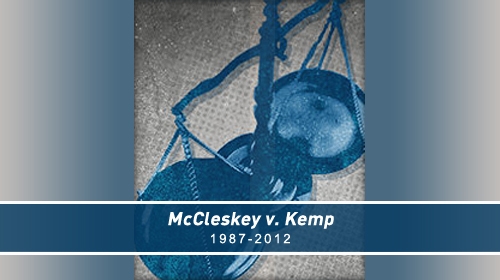
April 22 marks the 25th anniversary of the Supreme Court decision in McCleskey v. Kemp, in which the Court ruled that a defendant cannot rely upon statistical evidence of systemic racial bias to prove his death sentence unconstitutional, no matter how strong that evidence may be. McCleskey has been roundly condemned as a low point in the quest for equality that begs to be revisited. To mark the occasion, every day this week the ACLU Blog of Rights will feature a new post about McCleskey and its legacy. You can read all the posts here, and visit to learn more.
Twenty-five years ago this week the Supreme Court announced its decision in , ruling that a defendant cannot rely upon statistical evidence of systemic racial bias to prove his death sentence unconstitutional, no matter how strong that evidence may be. McCleskey has been roundly condemned as a "low point" in the quest for equality, comparable to Dred Scott v. Sanford (1857) — which held that people of African ancestry were not entitled to the protections of the Constitution — and Plessy v. Ferguson (1896) — which upheld racial segregation of public facilities.
McCleskey's reputation is well deserved. The case began when lawyers working with the NAACP Legal Defense Fund learned that University of Iowa professors David Baldus, Charles Pulaski and George Woodworth were conducting a large, sophisticated study of race and the death penalty in Georgia. showed that even after accounting for things like details of the crime and background information about the defendant, racial bias infected the death penalty in Georgia. Black defendants charged with the murder of white victims, like Warren McCleskey, were more than four times as likely to be sentenced to death as anyone else. The NAACP Legal Defense Fund lawyers took this evidence to court and argued that it showed an impermissible risk that racial bias contributed to Warren McCleskey's death sentence in violation of the Constitution.
A federal district court held a long hearing about the statistical evidence, ultimately ruling against Warren McCleskey based on quibbles over the methodology of the Baldus study. On appeal, the Court of Appeals assumed the validity of the statistical evidence but ruled that the disparities were insufficient to strike the Georgia death penalty because, in its view, they did not demonstrate discriminatory intent. The Supreme Court also ruled against Warren McCleskey — but on even more insidious grounds.
Like the lower appellate court, the Supreme Court assumed that the statistical evidence was valid. But the Court categorically rejected the idea that statistical evidence was sufficient to show a constitutional violation, requiring instead that a defendant show "exceptionally clear proof" of discrimination under the facts of his or her own case. This near impossibility effectively shut the door to any thing short of "smoking gun" evidence of intentional discrimination — evidence that is unlikely to exist, or unlikely to be discovered by the defense. Indeed, we are aware of no capital defendant who has prevailed under this standard in the 25 years since McCleskey was decided.
The Court's explanation for erecting such a high evidentiary standard was devastating: in the Court's view, racial disparities in criminal justice sentencing are "inevitable." This view was underscored in a McCleskey memo by Justice Antonin Scalia, found among Justice Thurgood Marshall's papers, in which Justice Scalia conceded that he had all the proof of discrimination he needed, and reported his opinion that racial bias was both "real" and "ineradicable."
The Supreme Court was blunt that its decision was motivated in part by fear that overturning Warren McCleskey's death sentence might open the door to similar results in other cases. The Court acknowledged it feared that if it recognized racial discrimination was a problem in capital cases, it might also have to recognize the harm caused by discrimination in other types of criminal cases. In other words, as Justice Brennan wrote in the dissent, the Court was afraid of "too much justice."
The McCleskey decision was a close one — the five justices in the majority won a slim victory over the bitter dissents of four. Over time, Justice Powell, the author of the majority opinion, in McCleskey. Yet Justice Powell never had the opportunity to recast his vote. In the 25 years since McCleskey, the Court has never revisited its shameful holding.
Learn more about race and the death penalty: Sign up for breaking news alerts, , and .


